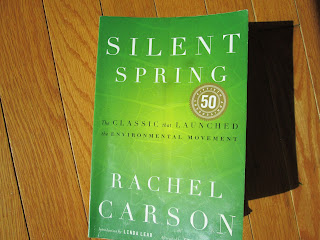Thank you for visiting my literary site. Make yourself comfortable and enjoy the ride. I blog about books. If you believe in the power of books to transform lives, you are in the right place. Join me in my reading adventures. To avoid confusion let me clarify that I do NOT have Instagram or Facebook. This is my only site. I publish between two and four posts per month.

Sunday, October 25, 2015
Climate change
"All truth passes through through three stages. First, it is ridiculed. Second, it is violently opposed. Third, it is accepted as being self-evident."
Arthur Schopenhauer, German philosopher(1788-1860)
Source of photo used in this post: http://time.com/4061371/south-carolina-flooding-climate-change/
Thursday, October 22, 2015
Silent Spring
In the year 1962 a woman stirred the waters of
conformity and ignorance by writing and publishing a book. Her name was Rachel
Carson. She wrote about the ecosystems and about how the misuse of pesticides
exacerbates the problems with insects and weeds instead of controlling them.
She also delved into the effects of many of these chemicals on human health.
Why is this important?
Fifty three years later her book “Silent Spring” continues to have relevance: the food we eat and the water we drink contain
pesticides. The case of Atrazine can be used as an example to illustrate how
her words resonate today.
Atrazine is a
pesticide used to kill weeds. Research has shown that Atrazine can cause cancer
in mammals and developmental problems in fish. It also changes male frogs into females. The European Union banned the use of Atrazine in 2004. The corporation
that manufactures this chemical is in Switzerland (Syngenta). I surmise it has
“power” over the decisions made by EPA because in the United States of America Atrazine continues to be used. 90% of the drinking water in the United States
of America contains Atrazine.
We signed a
petition to encourage the authorities to ban the use of Atrazine, but so far nothing has changed. (Profits matter more than human health
and the environment).
Reading
Rachel Carson’s Silent Spring motivated me to learn more about pesticides and
the current situation.
The use of glyphosate
The most well-known glyphosate is “Roundup. It
is manufactured by Monsanto.
The use of glyphosate is associated with birth defects, cancer,
miscarriages and stillbirths. In the year 2010 Professor Andres Carrasco of
Buenos Aries Medical School in Argentina published his findings on the effect
of glyphosate (Roundup) on chicken embryo. He decided to work on this kind of research after observing what happened to the people who live close to the farms. However, Monsanto still claimed that its
Roundup product was safe.
There were
violent attempts to silence Carrasco and his group. Four representatives of
Argentina’s crop protection trade group CASAFE tried to raid his laboratory. He
was also the focus of an orchestrated attack in which three people were
seriously injured when he was in an agricultural town in Argentina called La Leonesa, where he explained the findings of his research. Carrasco escaped injury by
locking himself in a car.
Glyphosates started to be used in La Leonesa
in 2000. Birth defects increased fourfold in the region around the town between
2000 and 2009, and the rate of childhood cancers tripled over the same period. Glyphosates are still used in Argentina.
Again, profits matter more than human health.
Despite the hazards associated with the use
of these chemicals manufactured by Monsanto they are also used widely in the
United States of America, not only to grow food but also to control weeds in
parks and pavements. On the other hand, countries like the Netherlands, Denmark, and Sweden have
either banned glyphosate or have restricted its use.
Roundup is spread on about 12 million acres of American farmland every year. Now the so-called "Superweeds", which are resistant to Roundup, are emerging. Rachel Carson discussed these patterns of resistance and an exacerbation of the original problems as a result of the abuse of pesticides.
Rachel Carson also explained that pesticides contained in runoff from farms and forests are being carried to
the sea in the waters of many rivers. She pointed out that the funds to research
the changes that these chemicals undergo during the transit period are small.
She proposed that some of the money invested in the development of toxic sprays
should be used on research to use less dangerous materials and keep poisons out
of the waterways. Then she asked the following question: when will the public
become sufficiently aware of the facts to demand such action? Her question is
relevant today.
What can we do?
Educating ourselves and our communities is our
duty.
Make
wise choices. Reduce your chemical imprint.
Support organic farming practices.
Environmentalists are urging farmers to adopt the
principles of integrated pest management (IPM), which encourages the use of
less toxic products and the use of other methods. Ladybugs, for example, are the
natural enemy of many insects.
The EU
encourages the reduced use of pesticides on farms and in homes. It has created
a directive on the sustainable application of pesticides.
References:
http://truth-out.org/archive/component/k2/item/92751:war-over-monsanto-gets-ugly
https://www.revealnews.org/article-legacy/5-pesticides-used-in-us-are-banned-in-other-countries/
http://gmwatch.org/gm-soy-sustainable-responsible-reports
http://savethefrogs.com/threats/pesticides/atrazine/index.html
https://www.revealnews.org/article-legacy/5-pesticides-used-in-us-are-banned-in-other-countries/
http://gmwatch.org/gm-soy-sustainable-responsible-reports
http://savethefrogs.com/threats/pesticides/atrazine/index.html
https://www.rt.com/usa/314544-california-epa-glyphosate-carcinogenic/https://www.rt.com/usa/314544-california-epa-glyphosate-carcinogenic/
Subscribe to:
Posts (Atom)



